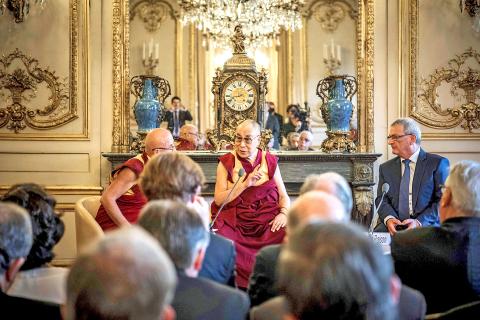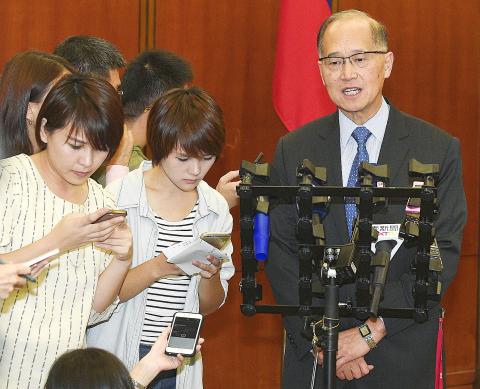China yesterday warned Taiwan not to allow exiled Tibetan spiritual leader the Dalai Lama to visit, after New Power Party Legislator Freddy Lim (林昶佐) issued an invitation.
President Tsai Ing-wen (蔡英文) has not said whether the government would allow a visit by the Dalai Lama, who congratulated Tsai on her “remarkable” victory in the Jan. 16 election.
Lim, an outspoken critic of Beijing, invited the Dalai Lama when he met him in India last week.

Photo: AFP
Ma Xiaoguang (馬曉光), spokesman for China’s Taiwan Affairs Office, told a regular news briefing in Beijing that the Dalai Lama “wears religious clothes to carry out separatist activities.”
“The intention of some forces in Taiwan to collude with separatists seeking ‘Tibet independence’ and to create disturbances will have a severe impact on relations across the Taiwan Strait,” Ma said. “We firmly oppose any form of visit.”
Lim’s assistant, Kenny Chang (張庭瑜), said that the Dalai Lama is highly respected in Taiwan and that Lim invited him “to share his ideas and religious philosophy.”

Photo: Chen Chih-chu, Taipei Times
On Tuesday, Minister of Foreign Affairs David Lee (李大維) told lawmakers that if the Dalai Lama decided to come, the ministry would review the matter carefully, Chinese-language media reported.
A ministry spokeswoman told reporters: “If he submits his [visa] application, the government will handle it based on relevant rules.”
Tenzin Taklha, an aide to the Dalai Lama in Dharamsala, India, the seat of the Tibetan government-in-exile, declined to comment yesterday when reached by telephone.
The Dalai Lama is currently on a visit to Europe. Yesterday he met with a group of French lawmakers at the Senate in Paris.
Former president Ma Ying-jeou (馬英九) refused the Dalai Lama entry several times after his last visit to Taiwan in 2009.
In 2008, the Democratic Progressive Party (DPP) criticized Ma’s administration for refusing to grant the Dalai Lama entry.
According to the Chinese-language Liberty Times (the Taipei Times’ sister newspaper), at the time Tsai characterized the Dalai Lama as “a friend of Taiwan” who was denied entry because Ma Ying-jeou was “afraid of China.”
She was quoted as saying that the nation should not be intimidated by China and that as DPP chairperson, she would be “steadfast in defending” this position.
Presidential Office spokesman Alex Huang (黃重諺) yesterday said that the office “would not comment on a hypothetical case.”
DPP spokesman Yang Chia-liang (楊家俍) last night said the DPP has long been concerned with religious freedom in China.
The government has rules it must follow in issuing visas and the DPP respects that, he said.
DPP Legislator Gao Jyh-peng (高志鵬), approached as he was leaving a Central Standing Committee meeting at the DPP’s headquarters in Taipei, said that he hoped the government would “tough it out” to welcome the Dalai Lama.
“From the perspective of the freedom of speech and asserting Taiwan’s sovereign independence, we have no cause to follow the example of the Ma [Ying-jeou] administration in refusing the Dalai Lama’s visit,” Gao said.
Additional reporting by Su Fang-ho

US President Donald Trump yesterday announced sweeping "reciprocal tariffs" on US trading partners, including a 32 percent tax on goods from Taiwan that is set to take effect on Wednesday. At a Rose Garden event, Trump declared a 10 percent baseline tax on imports from all countries, with the White House saying it would take effect on Saturday. Countries with larger trade surpluses with the US would face higher duties beginning on Wednesday, including Taiwan (32 percent), China (34 percent), Japan (24 percent), South Korea (25 percent), Vietnam (46 percent) and Thailand (36 percent). Canada and Mexico, the two largest US trading

AIR SUPPORT: The Ministry of National Defense thanked the US for the delivery, adding that it was an indicator of the White House’s commitment to the Taiwan Relations Act Deputy Minister of National Defense Po Horng-huei (柏鴻輝) and Representative to the US Alexander Yui on Friday attended a delivery ceremony for the first of Taiwan’s long-awaited 66 F-16C/D Block 70 jets at a Lockheed Martin Corp factory in Greenville, South Carolina. “We are so proud to be the global home of the F-16 and to support Taiwan’s air defense capabilities,” US Representative William Timmons wrote on X, alongside a photograph of Taiwanese and US officials at the event. The F-16C/D Block 70 jets Taiwan ordered have the same capabilities as aircraft that had been upgraded to F-16Vs. The batch of Lockheed Martin

GRIDLOCK: The National Fire Agency’s Special Search and Rescue team is on standby to travel to the countries to help out with the rescue effort A powerful earthquake rocked Myanmar and neighboring Thailand yesterday, killing at least three people in Bangkok and burying dozens when a high-rise building under construction collapsed. Footage shared on social media from Myanmar’s second-largest city showed widespread destruction, raising fears that many were trapped under the rubble or killed. The magnitude 7.7 earthquake, with an epicenter near Mandalay in Myanmar, struck at midday and was followed by a strong magnitude 6.4 aftershock. The extent of death, injury and destruction — especially in Myanmar, which is embroiled in a civil war and where information is tightly controlled at the best of times —

China's military today said it began joint army, navy and rocket force exercises around Taiwan to "serve as a stern warning and powerful deterrent against Taiwanese independence," calling President William Lai (賴清德) a "parasite." The exercises come after Lai called Beijing a "foreign hostile force" last month. More than 10 Chinese military ships approached close to Taiwan's 24 nautical mile (44.4km) contiguous zone this morning and Taiwan sent its own warships to respond, two senior Taiwanese officials said. Taiwan has not yet detected any live fire by the Chinese military so far, one of the officials said. The drills took place after US Secretary